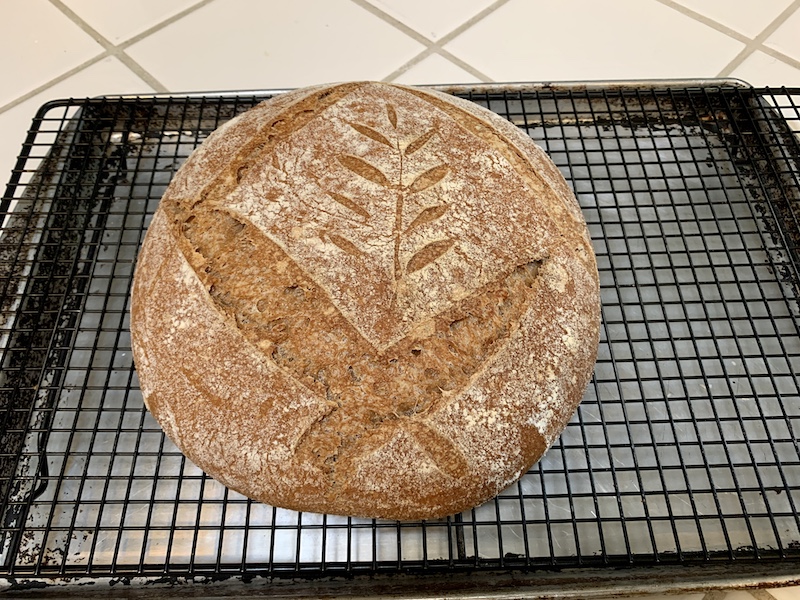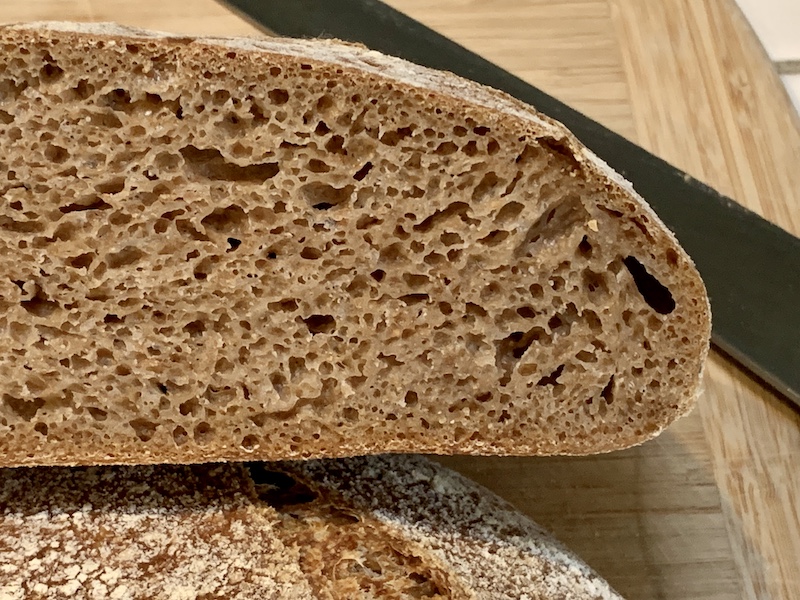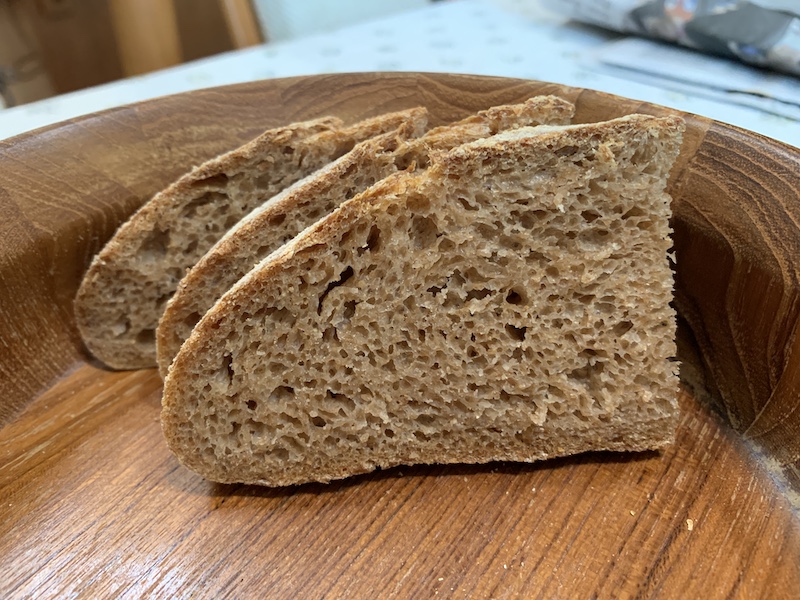
Whole Wheat Sourdough Bread, a rediscovery

Whole Wheat Sourdough
David Snyder
3/19/2023
Back in 2016, I was on a quest for a whole wheat sourdough bread I liked enough to want to bake often. I baked breads from a number of my favorite bread cookbooks, and none were bad. This bread was of my own formulation, and, as I recall, it was the one I liked the best. In spite of my good intentions at the time, I have not baked it again since. I think it just got forgotten. Flipping through my Sourdough Bread looseleaf recipe binder, I came across the formula and decided to make it again.
Originally, I mixed this bread in a stand mixer and baked with steam on a baking stone. This time, I mixed entirely by hand and baked in a cast iron Combo Cooker. The Whole Wheat flour in the Final Dough was freshly milled Turkey Red.
The previous version of this bread can be found here: https://www.thefreshloaf.com/node/45894/whole-wheat-sourdough-bread
Total Dough |
|
|
Ingredient | Wt (g) | Bakers' % |
AP flour | 103 | 21 |
Whole Wheat flour | 378 | 77 |
Whole Rye flour | 9 | 2 |
Water | 400 | 82 |
Salt | 10 | 2 |
Instant yeast | 1/8 tsp (<1) | <1 |
Total | 900 | 184 |
Levain |
|
|
Ingredient | Wt (g) | Bakers' % |
AP flour | 52.5 | 70 |
Whole Wheat flour | 15 | 20 |
Whole Rye flour | 7.5 | 10 |
Water (80dF) | 75 | 100 |
Active liquid starter | 30 | 40 |
Total | 180 | 240 |
Dissolve the starter in the water.
Add the flours.
Mix thoroughly.
Transfer to a clean container and cover tightly.
Ferment at 76ºF for 6-12 hours (until moderately ripe)
Optionally, refrigerate overnight.
Note: My liquid starter is a mixture of 70% AP, 20%WW and 10% Rye at 100% hydration.
Final Dough |
|
Ingredient | Wt. (g) |
AP flour | 40 |
Whole Wheat flour | 360 |
Water (80-90dF) | 310 |
Salt | 10 |
Instant yeast | 1/8 tsp (<1) |
Levain | 180 |
Total | 900 |
Procedure
In a large bowl, dissolve the levain in the water and mix in the flours. Cover the bowl and Autolyse for 20-60 minutes.
Sprinkle the salt over the dough and mix it in using the pinching and folding technique.
Repeat stretching and folding in the bowl to moderate gluten development.
Transfer to a clean, oiled, large bowl and cover.
Bulk ferment at 80ºF for 3-½ to 4 hours with stretch and folds at 30, 60 and 120 minutes.
Transfer to a lightly floured board and pre-shape round. Cover with a towel and let rest for 10-20 minutes.
Shape as a tight boule. Place in a floured banneton and place the banneton in a food safe plastic bag.
Proof at room temperature for 1 to 1-1/2 hours.
Cold retard for 8-12 hours.
The next morning, let the loaf continue to proof at room temperature until fully proofed, if needed. (I proofed for about 90 minutes before baking.)
Pre-heat oven to 500ºF with a rack in the lover third and the top (Deep part) of a Lodge cast iron “Combo Cooker” in the oven. (You can substitute any Dutch oven you prefer for bread baking. Also, I have found that pre-heating the Combo Cooker top makes little difference in the result of the bake.)
Turn the loaf onto the bottom (shallow part) of the Combo Cooker. (I line the pan with a 9” round silicon pan-liner and sprinkle the bottom of the loaf with semolina before turning it into the pan. I find this results in less chance of a burned loaf bottom.)
Lower the oven temperature to 475ºF. Carefully cover the loaf with the pre-heated top, and place the covered Combo Cooker in the oven.
After 30 minutes, remove the top of the Combo Cooker and lower the oven temperature to 460ºF.
Bake for another 15-20 minutes, until the loaf is fully baked. (Internal temperature at least 205ºF)
Transfer the loaf to a cooling rack. Cool completely before slicing.



This dough was lovely to work with. It was soft but not at all sticky and very extensible.
Tasted when (almost) cool, the crust is chewy in part and crunchy in part. The crumb is cool and tender with a delicious nutty wheat flavor and lactic acid tang. It is delicious with a thin spread of sweet butter. I had a slight problem denying myself of fourth slice with lunch.
I must say I really enjoy the particular flavor that fresh-milled Turkey Red wheat imparts to a loaf.
David


Comments
Looks nice and I'll bet it tastes great. Welcome back, glad to see you posting again.
Tony
David, of course the entire loaf looks great (crust, crumb, and neat design), but that crumb in particular looks so soft and moist. My one question is whether the somewhat miniscule amount of whole rye actually makes a discernible difference. It must (else why would you include it), but I am curious nonetheless.
Thanks for posting. It is always good to see your baking.
Ted
The rye in this is in the levain. My standard sd feeding has10% rye. That said, I have found even 5-10% rye in a loaf adds delicious complexity to the flavor.
I like your scoring and the crumb looks perfect. I’m curious what the small amount of yeast adds and why you decided to use it? Do you think if you omitted it would it have changed your outcome?
The usual rationale is it makes BF time more predictable. With my proofing box to regulate temperature, the yeast may not be necessary.
That’s what I thought. Thanks
Handsome loaf David with a beautiful crumb. Good to see you posting here again.
Benny